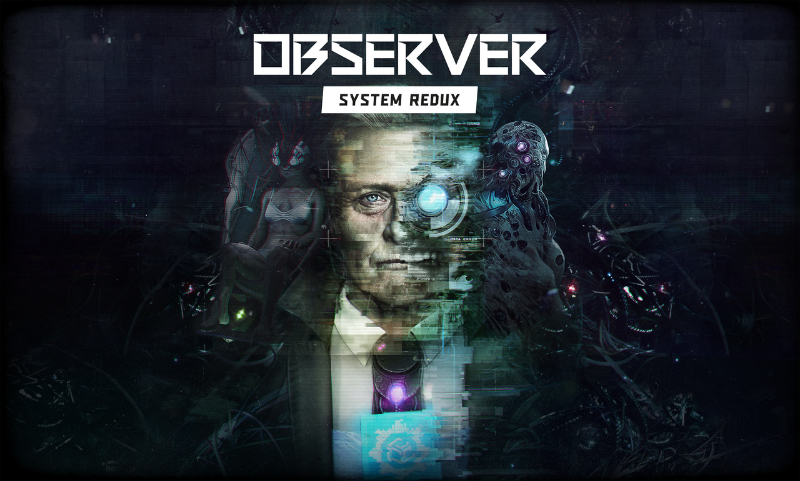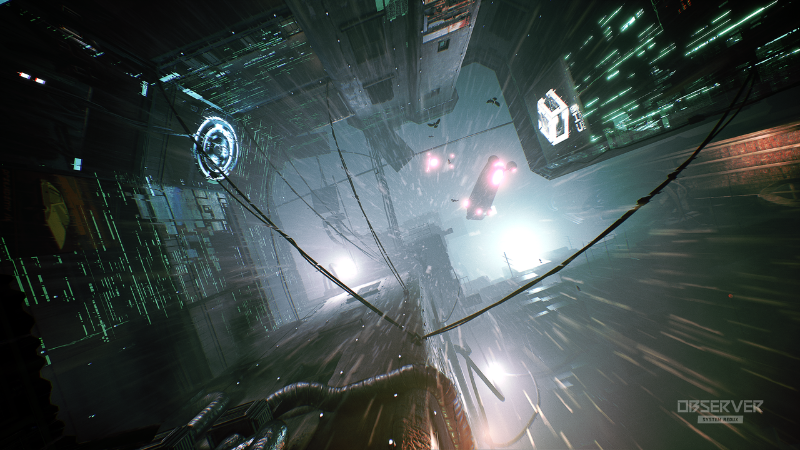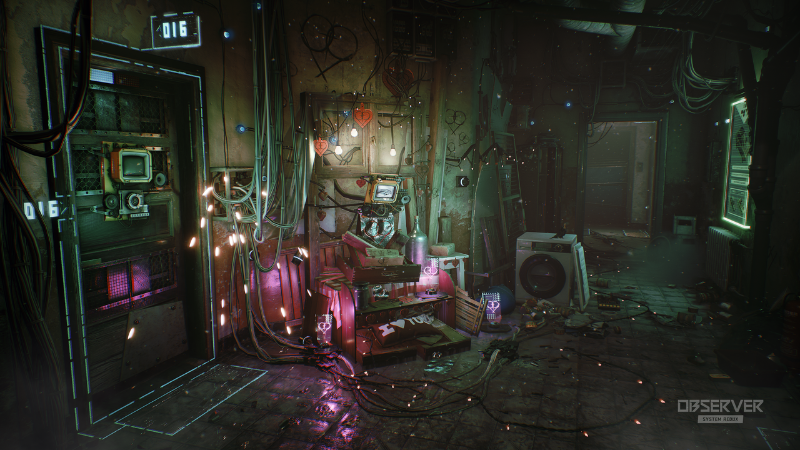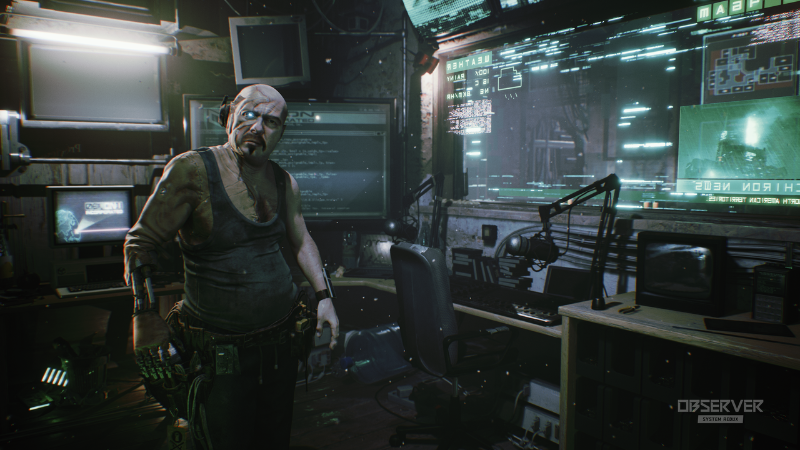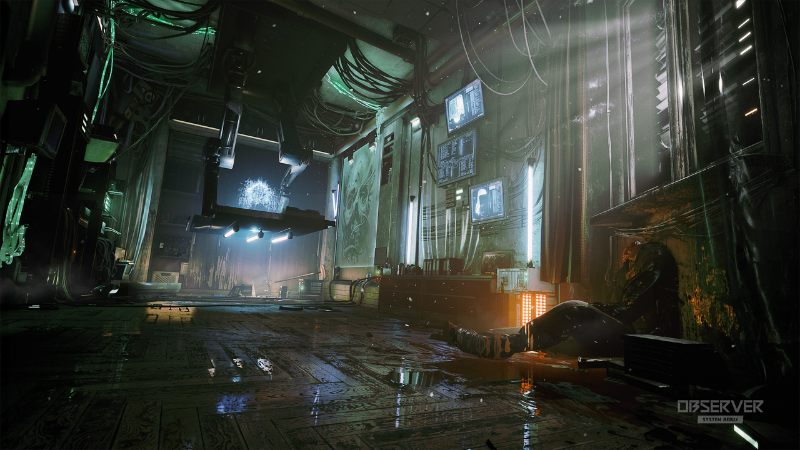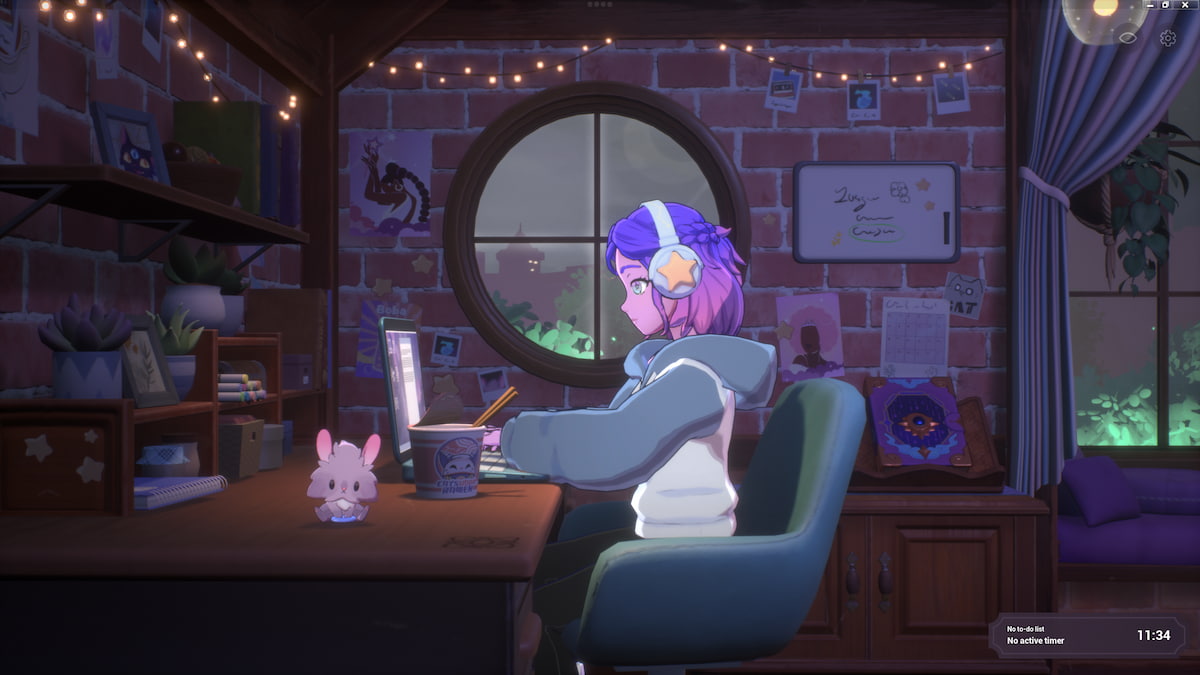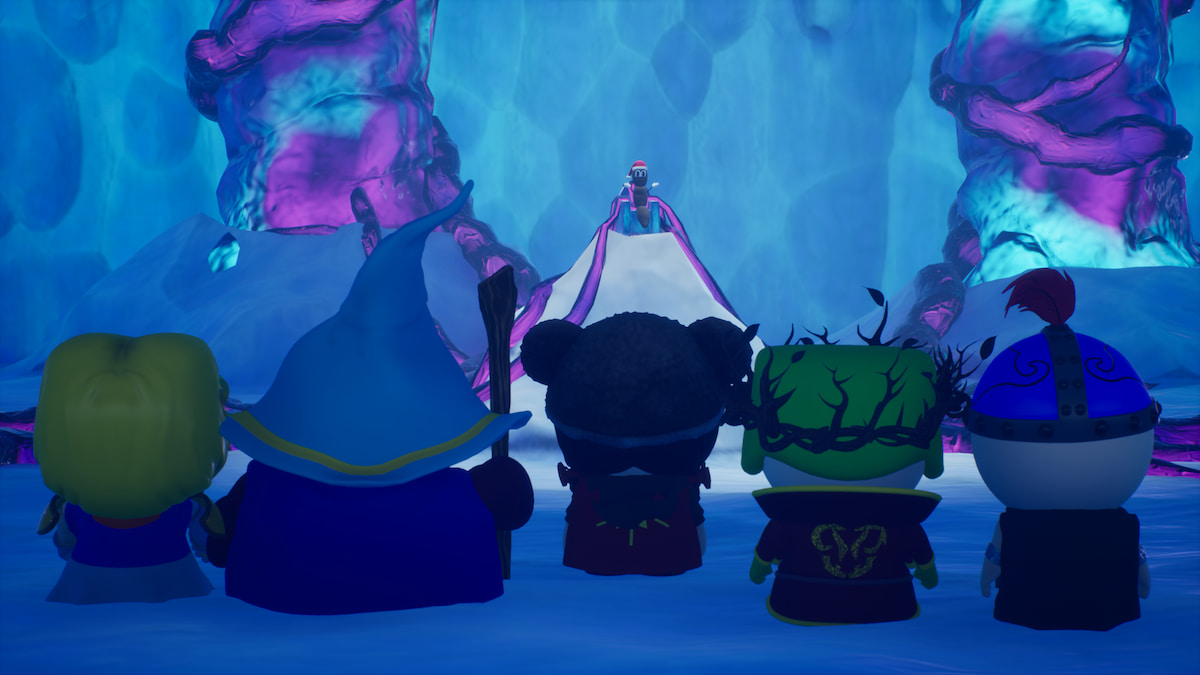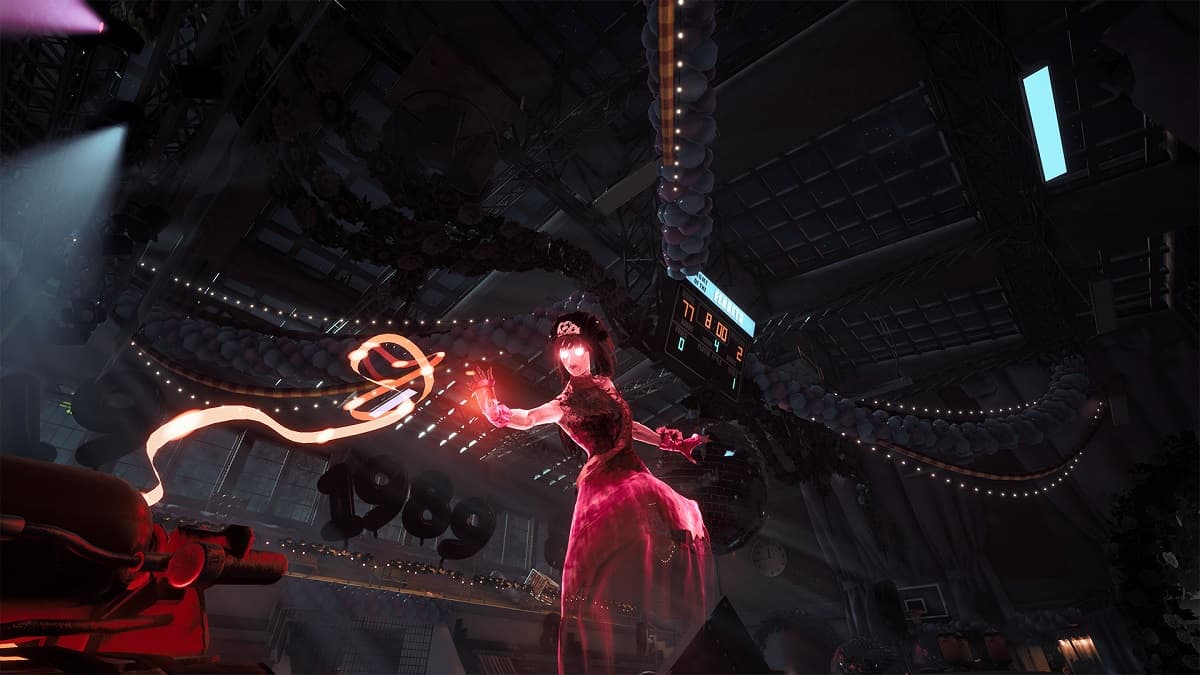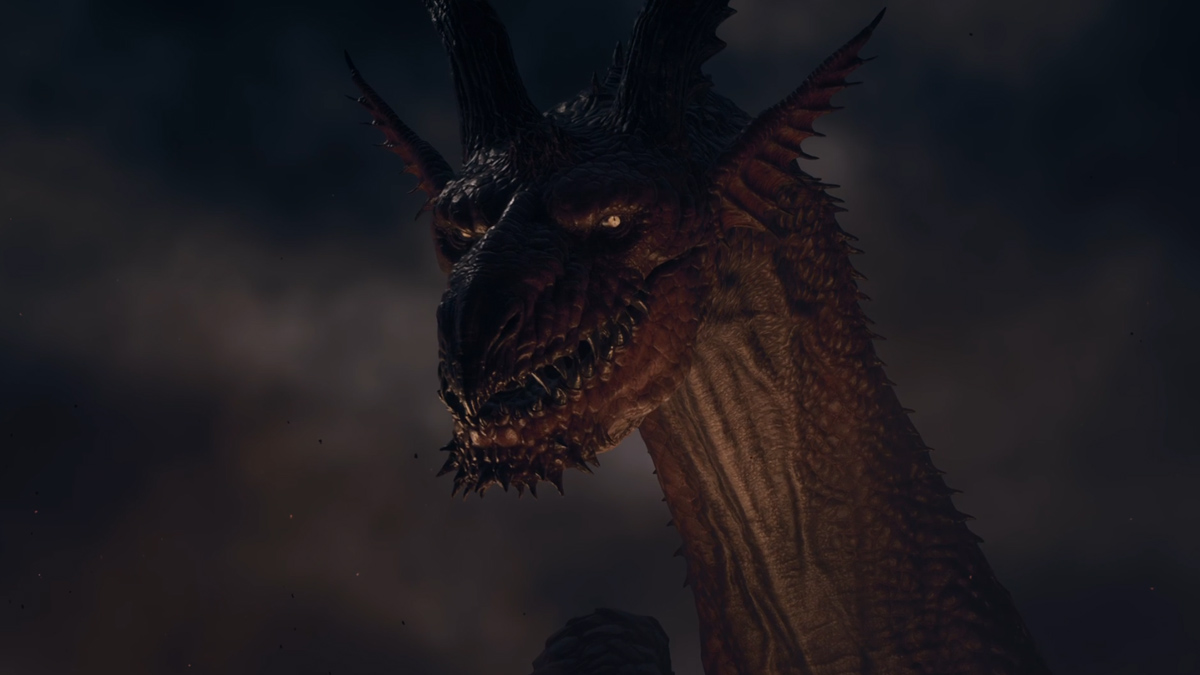In Bloober Team’s young history, the team has crafted horror stories exclusively, often seeking to capture the player’s attention with dramatic setpieces that play out more like unpredictable haunted houses than games utilizing inventive mechanics.
They are more adventure-horror than survival horror.
2017’s Observer diverted from the blueprint of Bloober’s breakout hit, Layers of Fear, and now with the new-generation version, Observer System Redux, the game moves even further away from that by adding more missions and some gameplay tweaks across the board, giving players more area to explore and more stories to discover.
These changes are appreciated, and the imagery is nothing if not memorable, but all these enhancements don’t augment the game’s central plot, which itself remains deliberately impenetrable for too long.
Observer System Redux Review: Dredging Up The Past
Observer takes place in 2084, in a cyberpunk dystopian hellscape where people hide in their apartments playing video games to dodge a virus that conspiracy theorists believe is no accident. This would-be sci-fi setup when the game came out in 2017 is now all too familiar in 2020, so it immediately presents an unexpected comparison, but to be fair to 2020, the similarities end there.
The next-gen enhancements, including 4K support and 60 frames per second presentation, are dazzling. The updates make a difference, especially for someone like me who bounced off the original game due to a growing disinterest unhelped by the game’s drab design.
The impressive lighting and smoother movements are the best of all, especially as one of the first next-gen games I’ve seen. As with the small handful of others I’ve played so far, the differences are apparent right away.
Despite those enhancements, Observer System Redux is an ugly, nauseating, even upsetting game throughout its roughly six-hour runtime. It is this way by choice, as the apartment complex where (technically) the entire game takes place is filthy, cluttered, and malfunctioning. I don’t know how long it’ll be until video games offer scented gameplay, but playing Observer makes you feel like you can smell the grime and decay of every apartment.
At one point, you rummage through a tenant’s porn collection in a room painted in blood and (ahem) cyber-spunk, and in another you relive the memories of an obsessive, hurtful artist. Still other times your door-to-door policing introduces you to residents yelling at their kids or beating their girlfriends. Some are paranoid to the point of intense personal anguish.
Wires spill out of every wall like a trash bucket overfilling from weeks of neglect, while robot maintenance workers are more often found broken down and in your way. I can’t imagine a single person in this world is living a life they enjoy.
It’s aggressively unpleasant by design, and that’s at once extremely commendable for the team, as it’s clearly their intent to deliver such an immersive vision, and also something of a deterrent to actually playing it. As engrossing as it is, it’s also just gross. Playing Observer only leaves me feeling like I need to shower.
As the titular mind-cop Daniel Lazarski, played by the late, great Rutger Hauer who died between the game’s two versions, you alternatingly explore the complex room by room looking for your missing and presumed dead son while regularly jacking into the minds of others you meet.
This process of “observing” is a tactic of the game’s hellish future where law enforcement can insert themselves into a person’s subconscious to learn what truths they aren’t sharing otherwise. But this is no police procedural. This is a horror game, and thus you aren’t interrogating crooks from some figurative police station in their heads. Instead, you’re moving through their worst nightmares and twisted dreams step by agonizing step, usually uninvited and always getting more than you bargained for.
These sequences prove the game’s concept, as Bloober Team manages to take its already impressive penchant for audiovisual spectacle first seen in Layers of Fear to new heights in this horrific cyberpunk world. Scene after scene, these more on-rails sections reveal the game at its best. Bloober Team knows so well how to stage these hazy, mind-bending sections, and for once I’d have much preferred a game where this was all it was.
Instead, the game intermingles these more authored moments with some open-ended exploration through the corridors and floors of the complex and adjacent buildings. These moments drag down the story terribly, often relying on your use of the game’s dual alternate vision modes, which let you scan for biological or mechanical clues. Glowing objects, basically.
It doesn’t feel so much like an investigation as all it requires is that you scan the two vision modes’ (again) ugly filters over every wall, table, and floor until they’ve found the right number of clues to initiate Lazarski’s next voice line, leading you onto the game’s much better horror setpieces.
There are very few moments where the game even puts you in real danger, which is normally a blemish in my mind, and in this case, it isn’t the game’s strong suit. Thus I appreciated how few hide-and-seek or chase scenes there are in Observer: System Redux, even with a few new missions thrown into the game this time.
It’s an up and down game, but nothing hurts it more than the deliberately obtuse story. Observer is so impenetrable for so long that it’s hard to care about the events. As a dad, I’m usually a sucker for stories about fathers and their kids — something the industry delivers at a good clip, no doubt — but Observer doesn’t pull on those heartstrings because it’s more focused on giving you an admittedly exhilarating drug-like trip.
These psychedelic horrors have never been better in video games, but alone they are merely pieces of art in a museum. Without the story to pull me in, my fascination with the audiovisual design lasts only as long as those scenes that deliver them. Dream-like as they are, they are similarly hard to recall when you leave them.
A good story sticks with you, and though Observer has some interesting things to say by the end, it uses its final scene to basically back up a dump truck of plot details and explain it all as the credits approach.
Observer System Redux Review — The Bottom Line
Pros
- Fascinating and trippy “dream” sequences
- Optional exploration usually delivers
- An intense feeling of time and place
Cons
- Investigative sections drag the game to a slow crawl
- Story waits until the final scene to make sense of most anything
- A world so grimy that it can be hard to play
Observer System Redux is the clearly superior version of the 2017 horror game. While it’s no sequel, a few new side missions and enhancements to the game’s look and feel are welcome and give Observer a fuller, more meaningful life on new-gen consoles.
This is still above all else a dirty, rotten game with so much pessimism bleeding through the walls that it can feel claustrophobic even to horror veterans like me. However, if you’re willing to trudge through the muck that this game calls a setting, the audiovisual experience is unlike anything else you’ll find in the medium.
[Note: Bloober Team provided the copy of Observer System Redux used for this review.]

